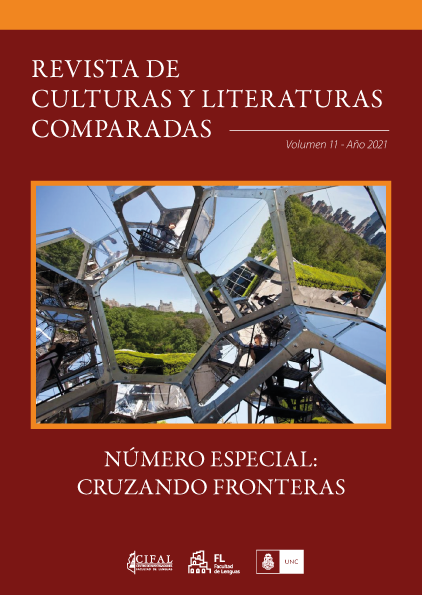Parodia, nostalgia y memoria cultural: el nuevo (meta) realismo de Sarah Waters en Fingersmith (2002)
Keywords:
Neo-Victorian, new (meta)realism, emplotment, disillusionment, re-enchantmentAbstract
This paper is part of a comprehensive research work focusing on Neo-Victorianism and the uses of nostalgia and subversion in Anglophone postmillennial novels. This particular presentation hinges on an exploration of Fingersmith (2002), a novel which Sarah Waters sets in the Victorian era by means of a style which Kohlke has called new(meta)realism. The faux-Victorian context of Fingersmith vindicates the sensation genre, the conventions of which it first invokes but later partially subverts through thematic concerns which are alien to that genre in order to launch a project aimed at rectifying the absence of a representation of lesbianism in nineteenth-century literature. Fingersmith’s style parodies the historical record’s deliberate concealment of what Hayden White has referred to as emplotment, but it does not indict such occlusion in the vociferous ways of historiographic metafiction. Instead, the text imitates the concealment of emplotment through a counterfactual tale that camouflages its own fictionality and its own (contemporary) moment of production. Thus the novel expands cultural memory – collectively shared and linked to the identity of a lesbian subjectivity – by taking recourse to verisimilitude. Far from interrogating the sensation novel subgenre, it reutilizes its transgressive energy to carry out an act of restorative justice. The novel is imbued with a nostalgic yearning – of a reflexive nature and pervaded by a spirit of disillusionment with respect to the present – which produces a utopian re-enchantment with writing strategies characteristic of Victorian literature. Such features are directly related to authorial powers which are perceived as having become diluted in the contemporary world. As a technology of memory, the novel proposes a paradigm in direct opposition to historiographic metafiction.
Downloads
References
Boym, Svetlana. The Future of Nostalgia. Nueva York: Basic Books, 2001.
Grainge, Paul. “Nostalgia and style in Retro America: Moods, modes, and media recycling”. Journal of American and Comparative Cultures 23:1 (2000). 27-34. Web. 20 noviembre 2015.
Hermann, Pernille. “Saga literature, cultural memory and storage”. Scandinavian Studies 85.3 (2013): 332-354. Web. 17 Noviembre 2015.
Hutcheon, Linda. A Theory of Adaptation. Londres y Nueva York: Routledge, 2006.
---. A Theory of Parody: The Teachings of Twentieth-century Art Forms. 1985. Urbana y Chicago: University of Illinois Press, 2000.
---. The Politics of Postmodernism. Londres y Nueva York: Routledge, 1989.
Kohlke, Marie-Luise. “Into History through the Back Door: The ‘Past Historic’ in Nights at the Circus and Affinity.” Women: A Cultural Review 15.2 (2008):153-66. Web. 17 Noviembre 2015.
Malcovich, Amberyl. Charles Dickens and the Victorian Child. Romanticizing and Socializing the Imperfect Child. Nueva York y Londres: Routledge, 2013.
Mangham, Andrew. “Introduction”. The Cambridge Companion to Sensation Fiction. Cambridge: Cambridge University Press, 2013. 1-6.
Marsh, Kelly A. “The neo-sensation novel: a contemporary genre in the Victorian tradition”. Philological Quarterly 74.1 (1995): 99-123. Web. 20 noviembre 2015.
McHale, Brian. Postmodernist fiction. Londres y NuevaYork: Routledge, 1987.
Mitchell, Kate. History and Cultural Memory in Neo-Victorian Fiction. Victorian Afterimages. Nueva York: Palgrave Macmillan, 2010.
Rousselot, Elodie. “Introduction: Exoticising the past in contemporary Neo-Historical fiction”. Exoticising the Past in Contemporary Neo-Historical Fiction. Ed. Elodie Rousselot. Londres y Nueva York: Palgrave Macmillan, 2014.
Wagner, Tamara S. “’We have orphans […] in stock’: Crime and the Consumption of Sensational Children”. En The Nineteenth-century Child and Consumer Culture. Ed. Dennis Denisoff. Burlington y Adershot: Ashgate, 2008. 201-216.
Warren, Andrea. Charles Dickens and the Street Children of London. Boston y Nueva York: Houghton Mifflin, 2011.
Waters, Sarah. Fingersmith. Nueva York: Riverhead Books, 2002.
Waugh, Patricia. Metafiction. The Theory and Practice of Self-conscious Fiction. Londres y Nueva York: Routledge, 1985.
White, Hayden. Tropics of Discourse. Essays in Cultural Criticism. 1978. Baltimore y Londres: The Johns Hopkins University Press, 1985.
Downloads
Published
Issue
Section
License

This work is licensed under a Creative Commons Attribution-NonCommercial-NoDerivatives 4.0 International License.
Aquellos/as autores/as que tengan publicaciones con esta revista, aceptan los términos siguientes:
a) Los/as autores/as conservarán sus derechos de autor y garantizarán a la revista el derecho de primera publicación de su obra, el cual estará simultáneamente sujeto a la Licencia de reconocimiento de Creative Commons.
b) La cesión de derechos no exclusivos implica que la publicación de los artículos en la presente revista no quita la posibilidad o el derecho al autor/a de publicar su obra de manera posterior en otras revistas u órganos editoriales y la autorización por parte de los/as autores/as para que el trabajo sea depositado en los repositorios institucionales, tales como el Portal de Revistas de la Universidad Nacional de Córdoba.



